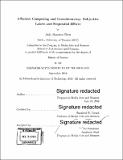Affective computing and crowdsourcing : subjective labels and sequential effects
Author(s)
Shen, Judy Hanwen.
Download1142196949-MIT.pdf (8.091Mb)
Other Contributors
Program in Media Arts and Sciences (Massachusetts Institute of Technology)
Advisor
Rosalind W. Picard.
Terms of use
Metadata
Show full item recordAbstract
Online platforms displaying long streams of examples are often employed to gather labels from both experts and crowd workers. While previous work in crowdsourcing has focused on objective tasks and estimating error parameters of annotators, collecting labels in a subjective setting (e.g. emotion recognition) is more complicated due to different interpretations of a stimulus (i.e. emotion). These interpretations could be influenced by many factors such as annotator mood, previously observed examples, and previously produced labels. This thesis investigates subjectivity and sequential effects in emotion recognition using a generative neural network to synthetically generate faces and empathetic dialog evaluation through an interactive platform. Comparing annotator agreement reveals that inter-rater agreement is lower for female faces and faces displaying negative emotion. Shuffling examples such that all annotators see a different randomized order further decreases annotator agreement, yet our experiments also reveal positive auto-correlation between sequential labels when annotators see all examples are in the same order; likely due to affective priming. To model these effects, matrix factorization is found to be effective in improving aggregation of dialog evaluation ratings (low-annotator agreement) while the Dawid-Skene model [1] improves label aggregation for both dialog and emotion recognition ratings.
Description
Thesis: S.M., Massachusetts Institute of Technology, School of Architecture and Planning, Program in Media Arts and Sciences, 2019 Cataloged from PDF version of thesis. Includes bibliographical references (pages 85-91).
Date issued
2019Department
Program in Media Arts and Sciences (Massachusetts Institute of Technology)Publisher
Massachusetts Institute of Technology
Keywords
Program in Media Arts and Sciences